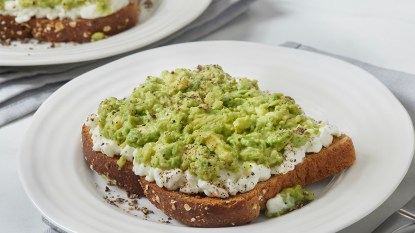Ward Off Heart Disease, Diabetes, and Obesity With This Once-a-Week Food Swap
No need to sacrifice flavor for deliciously healthy meals.

With meatless options now available at Burger King, Dunkin’ Donuts, Starbucks, and other fast-food chains, it’s clear that plant-based eating has gone mainstream. And for good reason: “Studies link high levels of meat intake with increased chronic disease risk,” asserts registered dietitian nutritionist Sharon Palmer, author of The Plant-Powered Diet: The Lifelong Eating Plan for Achieving Optimal Health, Beginning Today ($12.29, Amazon). Indeed, regularly eating red meat has been shown to increase the risk of heart disease, diabetes, and obesity. “But research consistently links plant-based diets with a lower risk of these diseases.”
Fortunately, you don’t have to convert to a 100 percent vegan diet to get results. “Even going meatless one day a week can make a big difference by lowering saturated fat and increasing fiber intake,” says Palmer. And according to a study of 16,000 Americans, our diets are healthier overall on days we avoid meat. “If you’re swapping out meat, even occasionally, your health is going to improve,” promises Nate Favini, MD, medical lead of Forward, a preventive primary care provider. And you can now find plant-based swaps for your favorite meats at grocery stores. Read on for the best options.
At breakfast: Try plant-based sausage.
There are so many plant-based products out there that it can be difficult to choose. Experts suggest replacing the meat on your breakfast plate with an alternative made with whole-food ingredients, like Hilary’s Breakfast Sausage (in the freezer case). “The first two ingredients are millet and lentils, two great-for-you foods that provide protein and fiber to keep you full longer,” says Amy Gorin, a registered dietitian nutritionist with Upfield, which makes plant margarines. Research at Tufts University shows meals with plant protein like lentils are just as filling as meals with animal proteins. And these “sausages” have five times less saturated fat than pork sausage — a boon for heart health.
At lunch: Go for ‘faux’ chicken salad.
“Many plant-based alternatives have a very high sodium content,” asserts Michael Greger, MD, author of How Not to Diet: The Groundbreaking Science of Healthy, Permanent Weight Loss ($15.06, Amazon). In fact, some “chicken” products have as much as 550 mg. per serving. Gorin suggests looking for brands with fewer than 300mg. of sodium. One to try: Quorn Meatless Fillets (in the freezer case), which are perfect for tossing into a salad or wrap, or stirring into soups and stews. Each serving contains just 120 mg. of sodium, along with 9 grams of protein and 9 grams of fiber. Plus, it has 75 percent fewer calories than the same amount of chicken breast.
At dinner: Serve up meatless ‘burgers.’
Eliminating half a serving of red meat every day was shown to decrease the chance of developing type 2 diabetes by nearly 15 percent in a study conducted by researchers at Imperial College London, so replacing beef with a plant-based option once a week is a no-brainer for health. “But some products contain oils that mimic juiciness while raising bad cholesterol,” asserts Dr. Greger. That’s why Gorin prefers Beyond Meat (in the meat aisle). Available in pre-shaped patties and crumbles, it’s made with pea protein and contains less saturated fat and more fiber than other meatless brands.
A version of this article originally appeared in our print magazine, First for Women.













